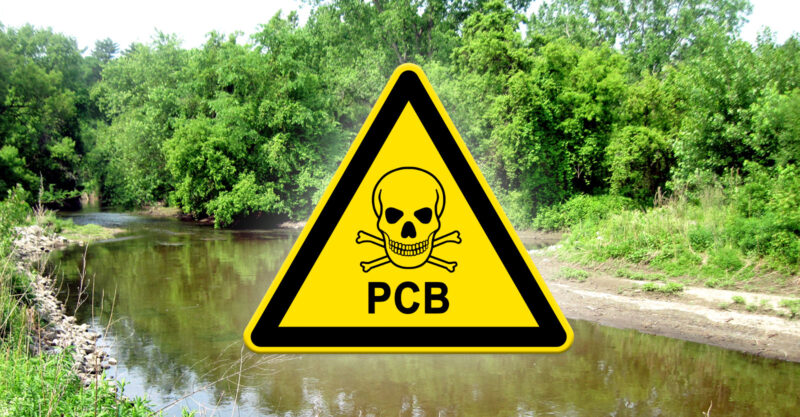Miss a day, miss a lot. Subscribe to The Defender's Top News of the Day. It's free.
By Dana Drugmand
For more than two decades, Nina McDermott was a fixture at Allendale Elementary School in Pittsfield, Massachusetts, teaching third grade to young students.
Even after being diagnosed with breast cancer and then kidney cancer McDermott kept working, fighting for her life as well as her job — until it became clear that her battle to beat the disease could not be won.
McDermott’s death in February 2022 left behind a grieving husband and daughter and marked yet another tragic loss for a community already rocked by disease and death.
Her family is among several that have recently filed a series of lawsuits attributing dire health problems to toxic chemical contamination that emanated for decades from a now-shuttered General Electric (GE) plant.
Allendale Elementary was built in 1950 on a donated parcel of land near property where GE discarded waste materials generated by its manufacturing of electrical transformers and soil from the GE site was used to help fill in school grounds.
The waste contained polychlorinated biphenyls, better known as PCBs, which were banned in 1979 in the U.S. and are linked to an array of human health concerns, including leukemia and other cancers. The chemicals persist in the environment, posing an ongoing threat.
PCBs from the GE plant also “heavily” contaminated the Housatonic River and other areas around the community, according to the U.S. Environmental Protection Agency (EPA).
Regulators have been working with GE on a cleanup plan, but townspeople say it’s too little too late, and the plan may actually make things worse.
“They’re not telling everybody what’s going on, they’re not telling anybody how dangerous everything is,” said Jessica Sullivan, whose 11-year-old son is battling brain cancer.
The boy, Justin Lowery, attended Allendale from kindergarten through fifth grade and lived for several years with his family in an apartment close to the now-closed GE plant site.
After being diagnosed in 2020, Justin spent about three weeks at Boston Children’s Hospital to undergo a surgical procedure to remove a tumor engulfing his cerebellum.
The contamination of Pittsfield, a city of roughly 50,000 people in western Massachusetts’ Berkshire County, and the surrounding area has spurred a community uprising of sorts.
This week back-to-back meetings are being held on Sept. 13 and 14 to coordinate action on the PCB contamination concerns.

‘Decimation and destruction’
Nine lawsuits have been filed so far in Berkshire County Superior Court in Pittsfield and more are expected.
In addition to GE, plaintiffs are suing PCB maker Monsanto and Bayer AG, which bought Monsanto in 2018; SABIC Innovative Plastics LLC, which took over GE’s Pittsfield operations in 2007 and later closed the plant; and other related corporate entities.
The companies were well aware of the dangers of PCBs but hid the risks from the public as they kept pumping them into the environment, the lawsuits claim.
The companies dispute the allegations and deny liability. Monsanto has agreed to pay out hundreds of millions in PCB-related claims elsewhere, however.
On Sept. 12, Pennsylvania officials said they had reached a $100 million settlement with the company for contaminating streams and lakes.
Among the plaintiffs is McDermott’s husband, who filed suit on Aug. 24, claiming wrongful death in addition to negligence, and fraud, among other things.
Also filing suit are sisters Paula King and Nancy King who attended Allendale Elementary School in the 1970s-80s, and developed cancers as adults. Another plaintiff, Kristie Harford, also attended the school as a child but developed cancer later.
Yet another plaintiff, Diane Romero, resides just a few hundred feet from the school where her two children attended. She developed aggressive breast cancer at age 41.
Then there is the case brought by a sister and brother who shared a home that sat just 1,500 feet from the old GE plant, on a road where dump trucks transporting PCB waste would frequently drive.
Plaintiff Betty Jackson is fighting pancreatic cancer that has metastasized, while her sister has already died of cancer. A third family member has also died from cancer.
Dylan Welch, 24, who attended Allendale as a child, is also a plaintiff. He developed a brain tumor that required multiple surgical procedures that left him with permanent scarring and seizure disorder, according to his lawsuit.
And, along with Sullivan, another Pittsfield mother is suing on behalf of her young son. Crystal Czerno’s 9-year-old son Carter LaCasse is battling leukemia after attending Allendale Elementary.
All of the lawsuits allege “decades-long decimation and destruction of the health and wellbeing” of area residents caused by the companies’ “intentional, repeated, and blatant pollution, dumping, use and disposal of toxic and cancerous chemicals” known as PCBs.
Results of groundwater testing conducted in 2022 show that three groundwater wells located adjacent to the school contained PCBs as well as a host of other toxins and chemicals such as dioxins, sulfide and volatile organic compounds including cyanide and arsenic.
The cancers developed by the children and adults who attended, worked or lived near the Allendale School and GE’s abutting toxic waste dump are “all traceable to the same horrible contamination,” said lawyer Thomas Bosworth, who is representing plaintiffs in the litigation against GE and the other companies.
“It’s a really serious problem,” he said. “It’s transcended generations at this point. They’re going to answer for every fact they concealed, every piece of property they’ve dumped onto, everything.”
Hill 78
The school property sits just 40 feet from a six-acre site the EPA calls Hill 78, which GE used as a landfill for waste materials generated by its plant. It was from here that soil was moved to the school grounds more than 50 years ago.
In 1991, well after the dangers of PCBs were known and the chemicals were banned, the company installed a temporary cap over the site.
The 1991 cap failed to contain much of the PCBs, however, authorities determined. In 1999, under an agreement with federal and state authorities, GE conducted a cleanup operation at the school that included removing contaminated soils from the school and relocating the materials back to Hill 78 and an adjacent disposal site called Building 71.
GE continued to dispose of PCB-laden soil, dredged from a portion of the polluted Housatonic River in Pittsfield, into Hill 78 through the early 2000s. Although the toxic disposal site was capped in 2009, a bottom liner was never installed, leaving open a seepage route for chemicals to leach out.
According to the legal complaints, “Soil sampling at Allendale Elementary School has consistently revealed levels of PCBs in the soil even after some removal efforts were made.”
But the contamination extends beyond the school grounds and the river.
A scientific study published just last year concludes: “Pittsfield, MA is very contaminated with PCBs.”
That study, which analyzed PCB levels detected in residents’ blood and in outdoor and indoor air, also concluded that continued exposure could occur just through breathing, noting the “very high” levels of lower chlorinated PCB congeners found in basement and living room air.
Similar to the situation at the Allendale school, some residential properties in Pittsfield received PCB-laden fill material delivered by GE in the 1940s and 1950s.
Internal memos from former GE employee R. Kelly Niederjohn, uncovered in 1997, spotlighted this issue, spurring the formation of a local citizen advocacy group called Citizens for PCB Removal.
Pittsfield resident Charles Cianfarini, interim executive director of the group, said the home where he grew up bordered one of the 13 “core properties” of concern discussed in the memos.
“That property as well as my neighbors’ properties were all discovered to have PCB contamination,” he said.
The EPA claims the situation is under control and there is no health risk. In a presentation to the Pittsfield City Council Health & Safety Subcommittee in April, the EPA concluded:
“To date, the data shows there is no health threat posed to Allendale School or the abutting neighborhood.”
Bosworth, the attorney representing the Allendale School plaintiffs, disputes the veracity of GE’s position. He said recent air and groundwater testing results that GE has performed reveal continuous PCB exposure at the school.
And though the EPA and some Pittsfield politicians say they believe the school playground is safe, Cianfarini said his group and other citizen environmental group leaders are “skeptical that the playground is safe for the children who play there.”
Tim Gray, executive director of the Housatonic River Initiative, a local environmental organization, said the contamination appears widespread.
“It’s just astounding what GE did, it’s all over the place, all over Berkshire County,” said Gray.

A ‘sacrifice zone’
In 2020, the EPA and GE agreed to a plan to relocate up to 1 million cubic yards of PCB-contaminated sediment from the Housatonic River with much of the contaminated waste going to a landfill in the county and other toxic material shipped out of state.
The PCB sediment is to be dumped at a site near the bank of the river in Lee, a town just south of Pittsfield, but residents are fighting the plan. They fear rather than containing the waste, the movement of the waste to the new site will end up spreading contamination.
Housatonic River Initiative has sought to block the plan, filing legal actions claiming the town of Lee never held a public vote on the matter. But they have so far been unsuccessful. Gray said the town of Lee is being turned into a “sacrifice zone.”
Earlier this year the town of Lee attempted to sue Bayer/Monsanto for knowingly selling harmful PCBs.
The case was dismissed, but the town is permitted to refile. Gray said that Christobal Bonifaz, a renowned environmental attorney who has previously taken on Chevron/Texaco, plans to refile the town’s case.
In August GE submitted a lengthy filing called a predesign investigation report for the Lee landfill.
The plan was scheduled to be discussed during a public meeting of a stakeholder group called the Citizens Coordinating Council on Sept. 13. On Sept. 14 the Housatonic River Initiative will host an informational meeting to talk about the Lee landfill and ongoing PCB contamination issue in the county.
“We know we’re right,” Gray said. “You should never build a toxic dump in a little town.”
For the Pittsfield mothers of children with cancer, filing lawsuits against GE and other corporate defendants is a way to take a stand against what they see as a grave injustice that has put children, including their own sons, at risk.
“It is wrong what they are doing and what they have done,” Czerno said.
When she bought her house right by the Allendale School in 2017, she said she was unaware of the school’s PCB contamination issue. GE and even city officials and EPA are “absolutely not” being honest and transparent about the situation, she said.
Sullivan agreed.
“We have all these pediatric cancers that are all linked to a very similar area, that has correlation with GE and the PCB dumping,” said Sullivan. “So without a doubt they’re putting children at risk. They’re putting everybody at risk.”
Originally published by The New Lede.
Dana Drugmand is a freelance environmental journalist reporting on climate and energy with a focus on climate accountability.






